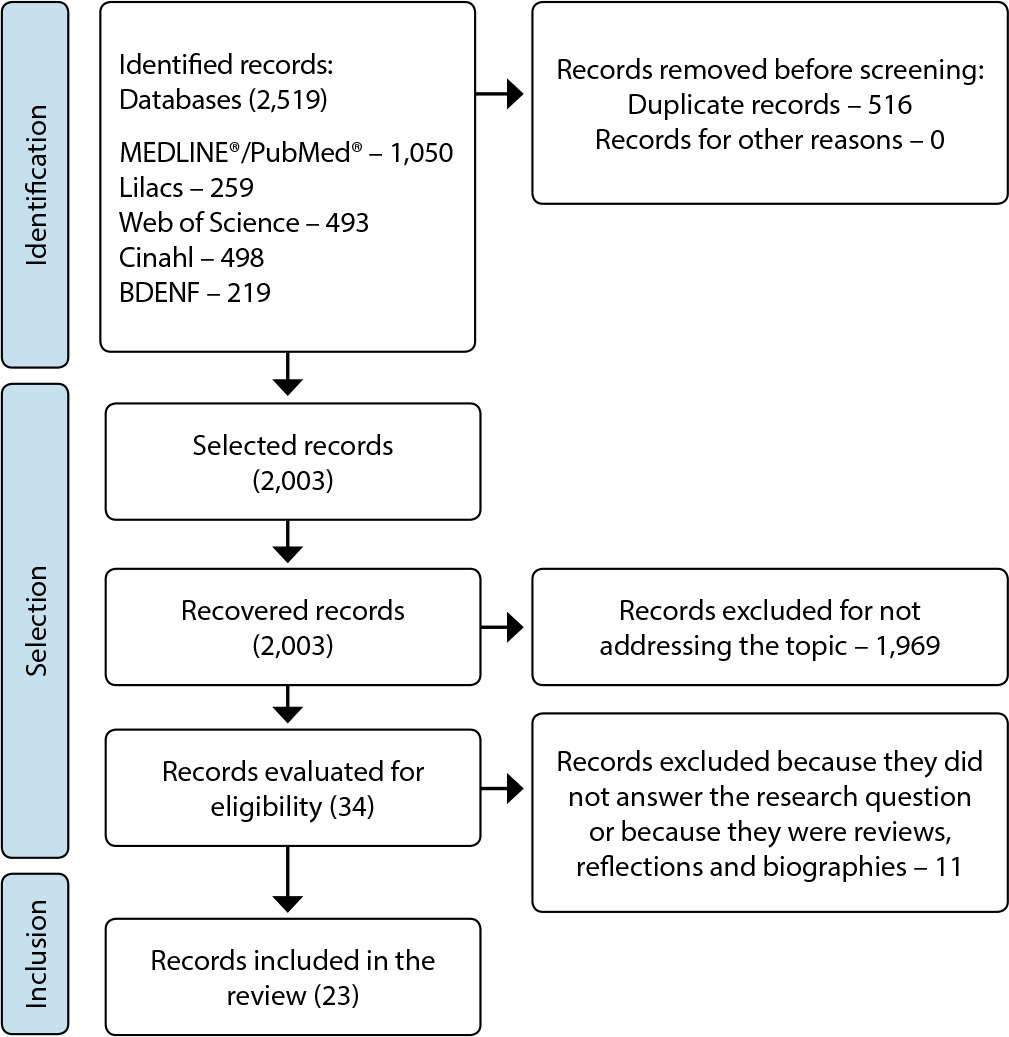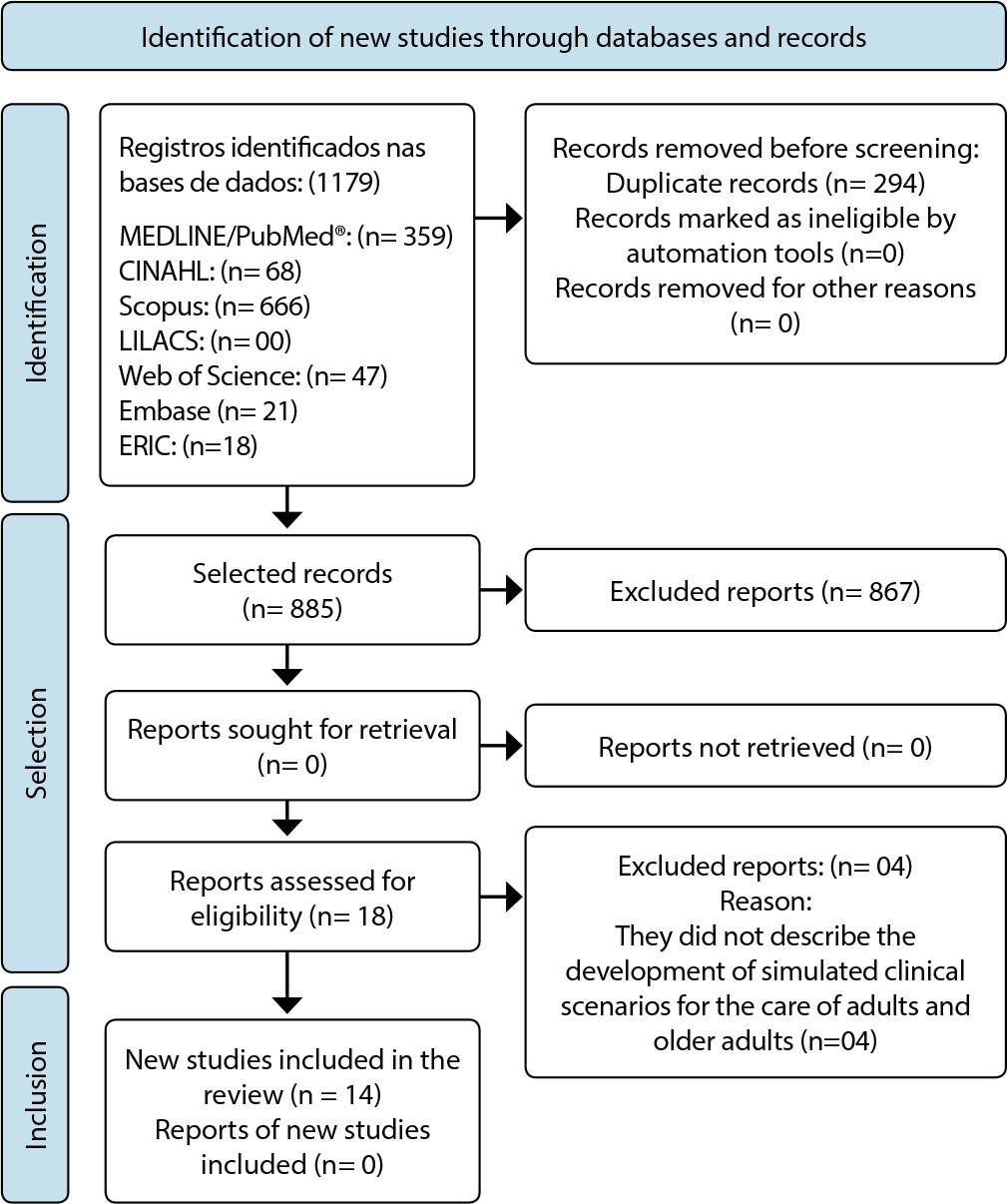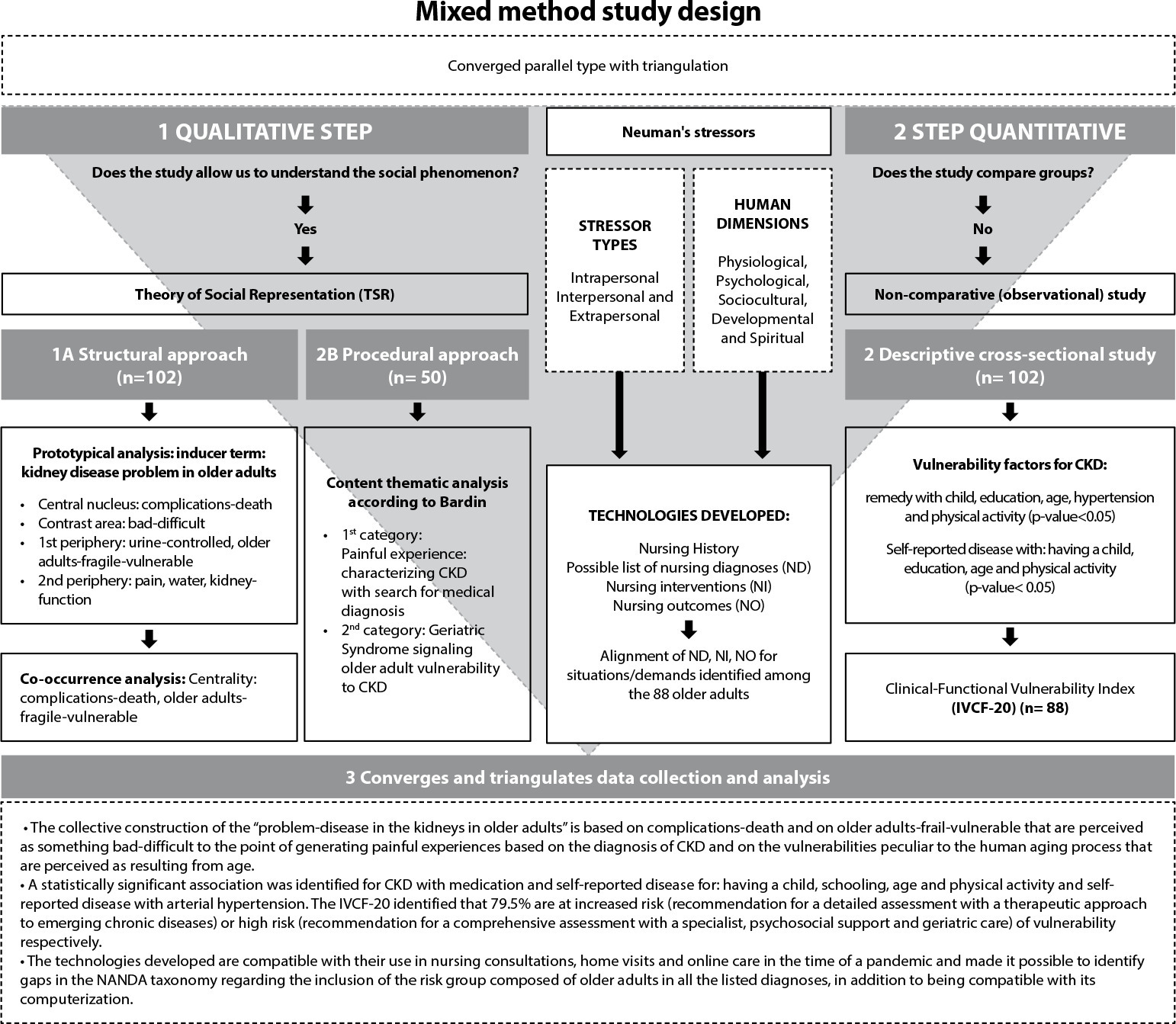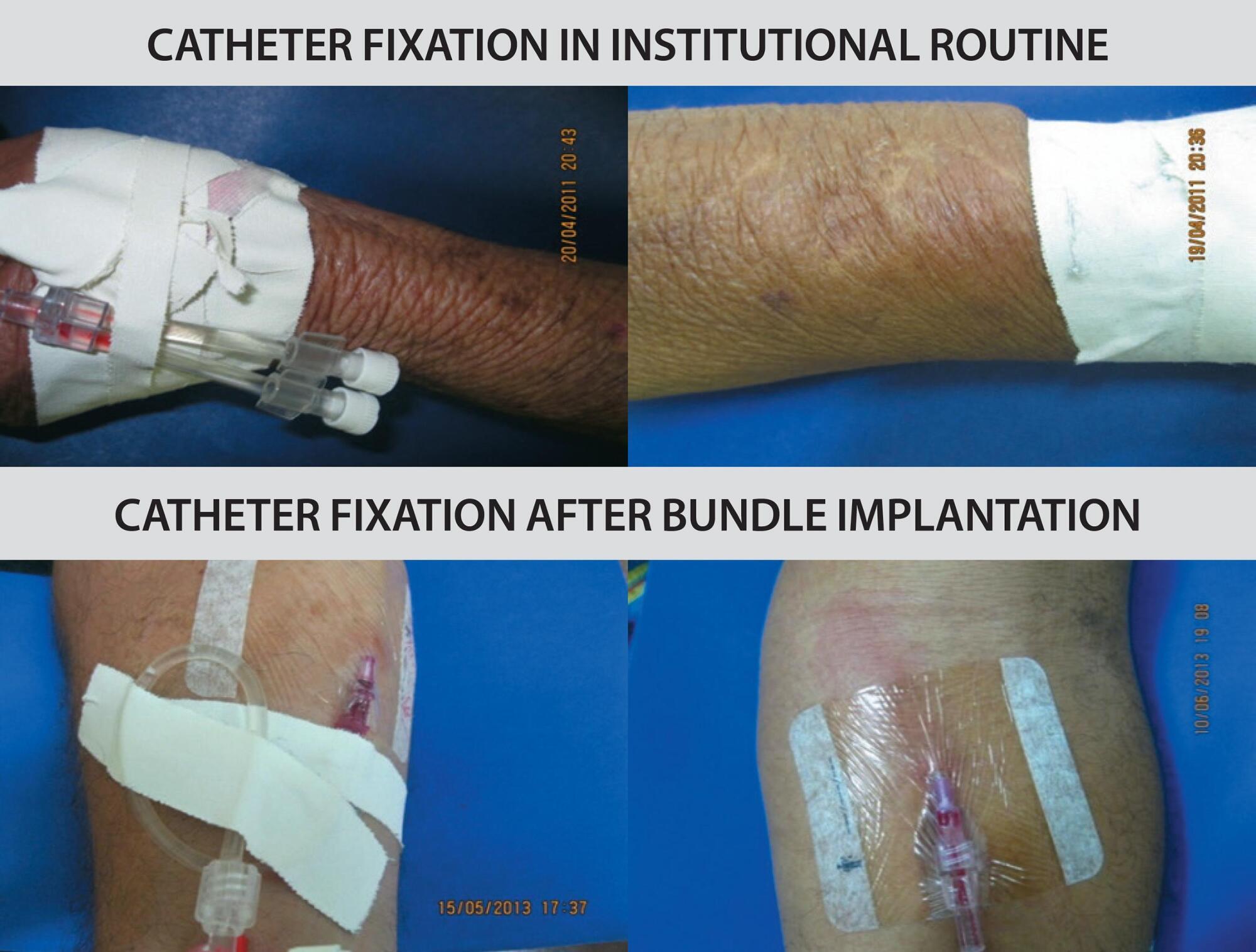-
ORIGINAL ARTICLE11-28-2023
Brazilian undergraduate nursing students’ critical thinking need to be increased: a cross-sectional study
Revista Brasileira de Enfermagem. 2023;76(1):e20220315
Abstract
ORIGINAL ARTICLEBrazilian undergraduate nursing students’ critical thinking need to be increased: a cross-sectional study
Revista Brasileira de Enfermagem. 2023;76(1):e20220315
DOI 10.1590/0034-7167-2022-0315
Views0See moreABSTRACT
Objectives:
to map Brazilian undergraduate nursing students’ critical thinking level and investigate the correlation between selected sociodemographic data and critical thinking domains.
Methods:
in this descriptive cross-sectional study, participants’ (N=89) critical thinking was assessed using the Health Science Reasoning Test. Correlation between critical thinking domains and sociodemographic data was assessed using the Pearson correlation coefficient.
Results:
the overall results showed a moderate level of participants’ critical thinking (mean = 70.7; standard deviation 5.7). A poor performance was identified in 5 of the 8 critical thinking domains. A significant positive correlation was found between education period and critical thinking (p<.001).
Conclusions:
poor level in students critical thinking domains may lead to negative consequences for their learning outcomes. Further studies should be carried out to confirm our results, in addition to investigation of teaching methods that encourage and ensure the development of students’ critical thinking skills during nursing education.
-
REVIEW11-28-2023
Contributions of the institutions for the nursing professionalization: integrative review (2010-2020) in the light of freidsonian conceptions
Revista Brasileira de Enfermagem. 2023;76(1):e20220153
Abstract
REVIEWContributions of the institutions for the nursing professionalization: integrative review (2010-2020) in the light of freidsonian conceptions
Revista Brasileira de Enfermagem. 2023;76(1):e20220153
DOI 10.1590/0034-7167-2022-0153
Views0See moreABSTRACT
Objective:
To analyze the contributions of the Brazilian Nursing Association and the Federal and Regional Nursing Councils in the literature for the professionalization of nursing in the light of Eliot Freidson’s theoretical conceptions.
Methods:
Integrative review of the literature, of socio-professional historical interest, carried out from June to November 2021, through the question: How did professional associations contribute to the professionalization of Brazilian nursing according to the literature from 2010 to 2020? The evidence were organized in a synoptic table, which allowed the construction of a conceptual map.
Results:
In the 23 selected studies, the professional associations presented scientific, social and political contributions, which shape the professional field of nursing, enabling knowledge/expertise, autonomy and self-regulation.
Final considerations:
The efforts of these institutions reaffirm nursing as an academic and consulting profession, capable of exerting control over the essence of nursing work. They strive to consolidate nursing as a legitimate professional field of health in Brazil.

-
EDITORIAL11-28-2023
The diagnosis and treatment of latent tuberculosis by nurses in Brazil: a necessary strategy
Revista Brasileira de Enfermagem. 2023;76(1):e760101
Abstract
EDITORIALThe diagnosis and treatment of latent tuberculosis by nurses in Brazil: a necessary strategy
Revista Brasileira de Enfermagem. 2023;76(1):e760101
DOI 10.1590/0034-7167.2023760101
Views0Tuberculosis (TB) prevention, from preventing the progression of infection to active TB, is the main strategy to reduce its incidence and to reach the goals defined by the World Health Organization, according to the End TB strategy().Brazil, ranking 19th in terms of the number of cases, assumed its commitment to institute preventive treatment, especially among […]See more -
REVIEW11-28-2023
Simulated scenarios in nursing: an integrative literature review
Revista Brasileira de Enfermagem. 2023;76(1):e20220123
Abstract
REVIEWSimulated scenarios in nursing: an integrative literature review
Revista Brasileira de Enfermagem. 2023;76(1):e20220123
DOI 10.1590/0034-7167-2022-0123
Views0See moreABSTRACT
Objectives:
to identify in scientific literature which simulated clinical scenarios were developed and validated for teaching and learning in nursing.
Methods:
integrative review, carried out in seven sources of information. The Rayyan program was used for selection, content analysis to explore the findings and the methodological assessment tool of the validity process, entitled Quality Appraisal tool for Validity Studies.
Results:
initially, 1,179 manuscripts were identified and 14 were part of the sample. Two categories were defined: Profile of simulated clinical scenarios produced in nursing; and Clinical skills developed and their assessment mechanisms.
Final Considerations:
there was a preponderance of high-fidelity scenarios, built in Brazil in the last five years, aimed at nursing students on the themes of emergency, maternal care and stomatherapy, addressing the assessment of cognitive, psychomotor and affective skills in nursing. Most studies obtained good methodological quality in their content validity process.

-
ORIGINAL ARTICLE11-28-2023
Factors associated with psychopathological symptoms among nurses at a university hospital
Revista Brasileira de Enfermagem. 2023;76(1):e20220075
Abstract
ORIGINAL ARTICLEFactors associated with psychopathological symptoms among nurses at a university hospital
Revista Brasileira de Enfermagem. 2023;76(1):e20220075
DOI 10.1590/0034-7167-2022-0075
Views0See moreABSTRACT
Objectives:
to analyze the factors associated with psychopathological symptoms among nurses at a university hospital.
Methods:
a cross-sectional study developed at a university hospital in Pernambuco, in which 90 nurses participated. A questionnaire with social and professional characteristics and the Symptom Assessment Scale were used.
Results:
an association was found between the variable changing profession and the presence of characteristic symptoms of psychoticism, somatization and anxiety among nurses.
Conclusions:
the emergence of psychopathological symptoms has influenced nurses’ desire to search for another profession. This evidence reinforces the need for greater investments in better working conditions and welcoming actions in the work environment, in order to provide a better quality of professional life and promote the health of these workers.
-
ORIGINAL ARTICLE11-28-2023
O pensamento crítico dos estudantes de graduação em enfermagem brasileiros precisa ser ampliado: estudo transversal
Revista Brasileira de Enfermagem. 2023;76(1):e20220315
Abstract
ORIGINAL ARTICLEO pensamento crítico dos estudantes de graduação em enfermagem brasileiros precisa ser ampliado: estudo transversal
Revista Brasileira de Enfermagem. 2023;76(1):e20220315
DOI 10.1590/0034-7167-2022-0315
Views0RESUMEN
Objetivos:
mapear el nivel de pensamiento crítico de los estudiantes brasileños de pregrado en enfermería e investigar la correlación entre los datos sociodemográficos seleccionados y los dominios del pensamiento crítico.
Métodos:
en este estudio transversal descriptivo, el pensamiento crítico de los participantes (N=89) fue evaluada mediante el Health Science Reasoning Test. La correlación entre los dominios de pensamiento crítico y los datos sociodemográficos se evaluó mediante el coeficiente de correlación de Pearson.
Resultados:
los resultados generales mostraron un nivel moderado de pensamiento crítico de los participantes (media=70,7; desviación estándar 5,7). Se identificó un desempeño deficiente en 5 de los 8 dominios del pensamiento crítico. Se encontró una correlación positiva significativa entre educación y pensamiento crítico (p<0,001).
Conclusiones:
los bajos niveles de los dominios del pensamiento crítico en los estudiantes pueden tener consecuencias negativas para sus resultados de aprendizaje. Se deben realizar más estudios para confirmar nuestros resultados, además de la investigación de métodos de enseñanza que fomenten y aseguren el desarrollo de habilidades de pensamiento crítico de los estudiantes durante su formación en enfermería.
Keywords:Educação em EnfermagemEstudantes de EnfermagemEstudos TransversaisPensamento CríticoServiços de SaúdeSee more -
ORIGINAL ARTICLE11-28-2023
Nursing protocol in chronic kidney disease prevention in older adults in primary care
Revista Brasileira de Enfermagem. 2023;76(1):e20220052
Abstract
ORIGINAL ARTICLENursing protocol in chronic kidney disease prevention in older adults in primary care
Revista Brasileira de Enfermagem. 2023;76(1):e20220052
DOI 10.1590/0034-7167-2022-0052
Views0See moreASBTRACT
Objectives:
to develop a protocol for Nursing Process operationalization in approaching older adults with vulnerability to chronic kidney disease in Primary Health Care, based on Neuman’s stressors.
Methods:
a methodological study, carried out in two stages: 1) synthesis of evidence using an inductive strategy (mixed method study) and 2) protocol development to support the nursing process operationalization with older adults enrolled in a Basic Health Unit, using a deductive strategy (Neuman’s stressor concepts, NANDA, NIC, and NOC taxonomies, Risner’s line of reasoning, and cross-mapping), described according to A Step-by-Step Guide to Developing Protocols.
Results:
102 older adults participated, and 17 diagnoses, 34 interventions and 26 nursing outcomes were identified.
Conclusions:
the protocol developed is a technology that makes it possible to operationalize the Nursing Process, based on Neuman’s stressors and on taxonomy, conceptual and care frameworks, guiding care and nursing records.

-
ORIGINAL ARTICLE11-28-2023
Handgrip strength in older adults and driving aptitude
Revista Brasileira de Enfermagem. 2023;76(1):e20210729
Abstract
ORIGINAL ARTICLEHandgrip strength in older adults and driving aptitude
Revista Brasileira de Enfermagem. 2023;76(1):e20210729
DOI 10.1590/0034-7167-2021-0729
Views0See moreABSTRACT
Objective:
to analyze handgrip strength as a predictor of the inability to drive in older adults.
Method:
a cross-sectional study conducted in traffic clinics with 421 older adults in Curitiba-Paraná from January 2015 to December 2018. A sociodemographic and clinical questionnaire, handgrip strength test, and queries from the National Registry of Qualified Drivers form were applied.
Results:
Reduced handgrip strength was not a predictor of inaptitude for vehicular driving (p=0.649). The predictors of inaptitude were: low education (p=0.011), incomplete elementary education (p=0.027), and cognition (p=0.020).
Conclusion:
reduced handgrip strength was not shown to predict for loss of driving skills in older adults. Low education level and reduced cognition level are conditions that were shown to be predictors for loss of vehicular driving license.
-
ORIGINAL ARTICLE08-19-2019
Psychosocial risks related to the nurse in the psychiatric hospital and management strategies
Revista Brasileira de Enfermagem. 2019;72(4):834-840
Abstract
ORIGINAL ARTICLEPsychosocial risks related to the nurse in the psychiatric hospital and management strategies
Revista Brasileira de Enfermagem. 2019;72(4):834-840
DOI 10.1590/0034-7167-2017-0311
Views0See moreABSTRACT
Objective:
To characterize the presence of psychosocial risks related to the work of the nurse in a psychiatric hospital and the strategies for managing these risks.
Methods:
Qualitative, in which 25 nurses from a psychiatric hospital participated using semi-structured interviews from November 2014 to January 2015. Data analysis was performed using the thematic method.
Results:
The results showed psychosocial risks related to the work of psychiatric nurses, such as: insufficient academic training; lack of preparation and maintenance of equipment; poor relationship with colleagues; shortage of human resources and lack of capacity building; conflict between the demands of the home and work, as well as strategies for managing psychosocial risks such as family, cinema, music, reading, among others.
Final considerations:
This study should provoke the reflection of managers and future nurses regarding the working conditions in a psychiatric hospital and possible psychosocial risks to which they are exposed.
-
ORIGINAL ARTICLE06-01-2020
Structural and procedural conditions in National Immunization Program Information System establishment
Revista Brasileira de Enfermagem. 2020;73(4):e20180939
Abstract
ORIGINAL ARTICLEStructural and procedural conditions in National Immunization Program Information System establishment
Revista Brasileira de Enfermagem. 2020;73(4):e20180939
DOI 10.1590/0034-7167-2018-0939
Views0ABSTRACT
Objectives:
to analyze structural and process conditions in National Immunization Program Information System establishment.
Methods:
a cross-sectional study conducted in 307 vaccination rooms in the state of Minas Gerais in 2017. For data collection, a multidimensional questionnaire was used. Descriptive data analysis was performed.
Results:
vaccination rooms have basic inputs necessary for System establishment. The greatest problems relate to professional practice. Low enrollment of population, failures in the active search for absentees, vaccine scheduling and absence of reports to monitor vaccination coverage were identified. Training was considered insufficient and ineffective.
Conclusions:
Immunization Information System is an essential technological innovation for the management of immunization actions. However, the production of timely records and the use of information are still challenges. Investments in training are required to ensure System’s management and operationalization activities.
Keywords:Evaluation StudiesHealth Information SystemsImmunization ProgramsInformation TechnologyNursingSee more -
Trends in fertility rates, proportion of antenatal consultations and caesarean sections among Brazilian adolescents
Revista Brasileira de Enfermagem. 2021;74:e20200884
Abstract
Trends in fertility rates, proportion of antenatal consultations and caesarean sections among Brazilian adolescents
Revista Brasileira de Enfermagem. 2021;74:e20200884
DOI 10.1590/0034-7167-2020-0884
Views0ABSTRACT
Objective:
To analyze the temporal trends in the fertility rate, proportion of antenatal consultations and caesarean sections in Brazilian adolescents aged 15 to 19, between 2000 and 2015. Methods: The fertility rate, proportion of prenatal consultations and proportion of routes of birth were calculated using data from DATASUS. The trend analysis was performed using the Prais-Winsten regression model and the annual percentage change.
Results:
There was a trend of reduction of 3.5% per year in the fertility rate among adolescents (p<0.05), in addition to an increasing trend of 6% per year in the proportion of more than six antenatal consultations (p <0.0001) and an increasing trend of 6.8% per year in the proportion of caesarean sections (p<0.0001).
Conclusion:
Despite the decreasing trend in fertility rates among Brazilian adolescents, they remain high. Also noteworthy is the growing trend for caesarean sections, even with improved access to antenatal care.
Keywords:Birth RateCaesarean SectionDescriptors:Pregnancy in adolescencePrenatal CareTime Serie StudiesSee more
-
ORIGINAL ARTICLE10-21-2019
Nursing protocol in vascular trauma prevention: peripheral catheterization bundle in urgency
Revista Brasileira de Enfermagem. 2019;72(6):1512-1518
Abstract
ORIGINAL ARTICLENursing protocol in vascular trauma prevention: peripheral catheterization bundle in urgency
Revista Brasileira de Enfermagem. 2019;72(6):1512-1518
DOI 10.1590/0034-7167-2018-0457
Views0See moreABSTRACT
Objective:
to create, apply and analyze in clinical practice the effectiveness of a bundle to prevent peripheral vascular trauma to approach the peripheral venous puncture process.
Method:
action research with 435 adult participants in an emergency service from 2011 to 2013. Creation of the bundle for prevention of vascular trauma based on scientific evidence, ease of operation, observation and measurement with implantation through an educational intervention of the team of nursing. Effectiveness analyzed by descriptive and inferential statistics using chi-square. Consecutive sample with 95% confidence interval.
Results:
Five stages of the bundle were related to the catheter fixation, permanence and removal process. The incidence of vascular traumas due to vein punctures reduced by 46.41% after implantation of the bundle to prevent vascular trauma associated with emergency peripheral catheterization.
Conclusion:
The bundle in clinical practice reduced vascular traumas by venipuncture.

-
ORIGINAL ARTICLE09-21-2020
Autonomy in the reproductive health of quilombolas women and associated factors
Revista Brasileira de Enfermagem. 2020;73:e20190786
Abstract
ORIGINAL ARTICLEAutonomy in the reproductive health of quilombolas women and associated factors
Revista Brasileira de Enfermagem. 2020;73:e20190786
DOI 10.1590/0034-7167-2019-0786
Views0ABSTRACT
Objective:
Identify the level of reproductive autonomy of quilombola women and associate it with sociodemographic characteristics and aspects of sexual and reproductive health.
Methods:
Cross-sectional census study carried out in quilombola communities in a municipality in Bahia. Data was collected through questionnaires from the National Health Survey and the Reproductive Autonomy Scale, applied to quilombola women who agreed to participate. Descriptive statistics procedures were used and associations were made between reproductive autonomy scores and sociodemographic and reproductive characteristics.
Results:
The average total score for reproductive autonomy was 2.06. An association was found between the “decision-making” score and marital status. The score for “total reproductive autonomy” was associated with the use of contraceptive method.
Conclusion:
The reality of the study participants converges with the literature regarding the interference of sociodemographic and reproductive factors in the reproductive autonomy of black women.
Keywords:African Continental Ancestry GroupPersonal AutonomyReproductive HealthSocioeconomic FactorsWomenSee more -
ORIGINAL ARTICLE09-16-2019
Playful educational intervention with schoolchildren on intestinal parasitosis
Revista Brasileira de Enfermagem. 2019;72(5):1203-1210
Abstract
ORIGINAL ARTICLEPlayful educational intervention with schoolchildren on intestinal parasitosis
Revista Brasileira de Enfermagem. 2019;72(5):1203-1210
DOI 10.1590/0034-7167-2017-0551
Views0See moreABSTRACT
Objective:
To analyze the playful educational interventions in the knowledge of schoolchildren about intestinal parasitosis.
Method:
This is a quasi-experimental, non-randomized study, based on pre- and post-intervention, conducted in a public elementary school in a peripheric neighborhood in the city of Ribeirão Preto (SP). The study population consisted of 101 students enrolled in the 5th and 6th grade. For comparison, we used the generalized version of the McNemar chi-squared test.
Results:
Of the 101 schoolchildren who participated in the study, 48 (47.5%) were female and 53 (52.5%) were male, aged from 9 to 14 years. Students’ knowledge on intestinal parasitic infections has increased significantly after the playful educational intervention.
Conclusion:
Playful educational interventions are an excellent didactical resource in the teaching-learning process of schoolchildren.
-
ORIGINAL ARTICLE02-10-2020
Group Brief Intervention: effectiveness in motivation to change alcohol intake
Revista Brasileira de Enfermagem. 2020;73(1):e20180138
Abstract
ORIGINAL ARTICLEGroup Brief Intervention: effectiveness in motivation to change alcohol intake
Revista Brasileira de Enfermagem. 2020;73(1):e20180138
DOI 10.1590/0034-7167-2018-0138
Views0See moreABSTRACT
Objective:
To verify the effectiveness of the group brief intervention (GBI), performed by nurses in motivational stages to change the pattern of alcohol intake.
Method:
Randomized controlled trial with 3-month follow-up. The ruler of readiness for change was applied in 180 individuals with risk or harmful alcohol intake pattern in basic health unit. Only the experimental group (EG) was submitted to the intervention. Both groups (experimental and control [CG]) participated in the follow-up.
Results:
EG had a mean score before GBI=6.55 (SD=3.41) points (preparation). After GBI=8.00 (SD=2.88) points (action) and in the follow-up 7.92 (SD=3.06) points (action). CG presented a mean score before GBI=5.42 (SD=3.26) points (preparation); after GBI=6.67 (SD=3.05) points (preparation) and in the follow up had a mean score of 4.80 (SD=2.86) points (contemplation). There was a statistically significant difference between the two groups at the motivational stages (p≤ 0,03).
Conclusion:
It was evidenced that GBI was effective in increasing the motivation to change harmful alcohol intake.

-
EXPERIENCE REPORT11-13-2020
Pedagogical mediations for non-formal nursing teaching during the COVID-19 pandemic
Revista Brasileira de Enfermagem. 2020;73:e20200499
Abstract
EXPERIENCE REPORTPedagogical mediations for non-formal nursing teaching during the COVID-19 pandemic
Revista Brasileira de Enfermagem. 2020;73:e20200499
DOI 10.1590/0034-7167-2020-0499
Views0See moreABSTRACT
Objective:
to report the experience of developing pedagogical mediations in a Virtual Learning Environment implemented in a nursing faculty during the COVID-19 pandemic.
Methods:
an experience report on the construction of a distance course aimed at graduates and residents of a nursing faculty at a public university located in the city of Rio de Janeiro.
Results:
the course’s conception, operationalization and implementation were the result of a collective work that culminated in a non-formal, virtual and problematic teaching process, which reached a participation rate of 82% of enrolled students.
Final considerations:
even in times of social isolation, the course promoted collaborative learning of knowledge about COVID-19 and strengthened the relationship between professors and students. The possibility of carrying out distance activities based on solid methodological proposals that contradict the content logic often observed in distance learning is emphasized.

Search
Search in:
Nuvem de Tags
Aged (144) Atenção Primária à Saúde (239) COVID-19 (104) Cuidados de Enfermagem (269) Educação em Enfermagem (151) Educação em Saúde (139) Enfermagem (930) Estudos de Validação (131) Health Education (144) Idoso (208) Mental Health (149) Nursing (987) Nursing Care (306) Patient Safety (151) Primary Health Care (284) Qualidade de Vida (104) Quality of Life (106) Saúde Mental (145) Segurança do Paciente (150) Validation Studies (108)



